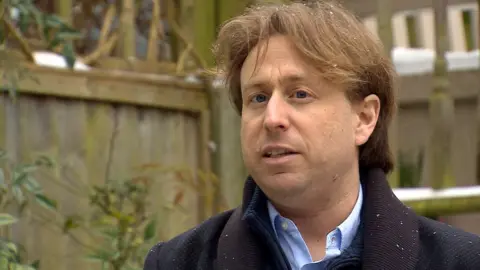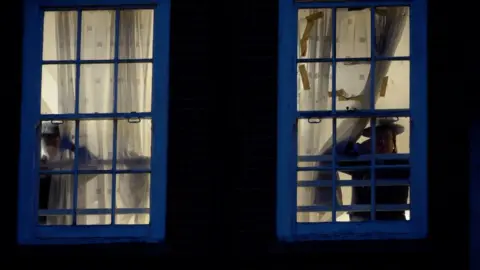Covid: Rabbi urges pause to ultra-Orthodox wedding parties
A senior rabbi in London's strictly Orthodox Jewish community has condemned those holding large celebrations, after police broke up a 150-strong wedding party in the area last month.
The BBC has been sent a video of guests dancing at another wedding in Stamford Hill, also believed to be last month.
Research shows the community has one of the world's highest past Covid rates.
"Weddings should not go on under these circumstances," Rabbi Herschel Gluck told the BBC.
High rates of Covid-19 in the community have been partly blamed on misleading legal advice that has been circulating in community newsletters, which says celebrations can have "as many guests as one likes".
Community leaders told the BBC they hope media attention following January's police raid on a wedding at a school in the Stamford Hill area of north London, will have reduced the number of gatherings.
Asking to remain anonymous, a senior source from the community said weddings were widespread apart from on religious festivals and on the sabbath or Shabbat: "When the custom allowed it, weddings were happening every single night."
Rabbi Gluck, president of Shromrim, a neighbourhood watch group in Stamford Hill, confirmed: "Weddings are very central in Judaism.
"In the Torah the first commandment is 'be fruitful and multiply'.
"It goes to the very core of the Jewish experience. Therefore there is a great need and a great urge to have weddings - but we need to put the brakes on," he said.
'Wrong tone'
Legal advice was distributed to thousands of homes in the community and could have convinced some they could continue because it said "simchos", or celebrations "have a communal prayer element".
One edition, dated 10 December, wrongly said this sort of event "can have as many guests as one likes".
Communal worship is allowed under the current lockdown, with strict social distancing.
But weddings are banned apart from in exceptional circumstances, and with no more than six people.
The human rights barrister and expert on coronavirus restrictions Adam Wagner said the advice had "hit the wrong tone".
"It was really about getting around the rules rather than keeping to the rules because of the danger of the virus," he said.

The guidance has since been revised and a senior representative of the strict Orthodox community said the overwhelming majority were making sacrifices every day to comply with the restrictions.
Joel Friedman, director of public affairs at the Interlink Foundation, a representative body for ultra-Orthodox organisations, said: "We have worked consistently throughout lockdown with local authorities to promote the guidance and are all disappointed when we hear about actions that put lives at risk."
Wedding dance
Several sources said a large traditional wedding captured in a video sent to the BBC, had taken place in early January with dancing, and little evidence of social distancing or mask wearing.
The UK went into national lockdown on 6 January, but even before that large events were banned.
After we emailed a representative of a senior figure who appeared to have attended the event, an audio message was circulated on WhatsApp groups in North London warning that the BBC had video of the event.
"Friends we have to do something here," the message said, referring to "the wedding last month".
"This is no joke mail, most of all, we need to kill this," it said.
Highest infections
London's ultra-Orthodox community took part in a study by the London School of Hygiene and Tropical Medicine which showed it had a past infection rate of 64%, nine times higher than the UK average of 7%.
This means the Stamford Hill community's infection rate is "among the highest reported anywhere in the world," researchers said.

Many families in the community are larger than average and prayer is an important part of the daily routine, with worshippers going to their local synagogue several times a day, increasing the risk of transmission of the virus.
The government has decided not to close places of worship, and in many Orthodox areas they remain open, with prayers throughout the day and evening.
Legally there are no limits on numbers, and though risk assessments should be done, there is no requirement to publish them.